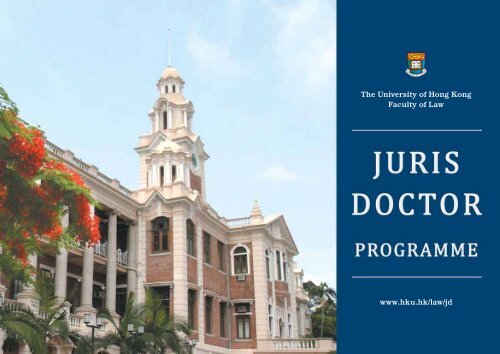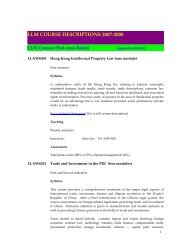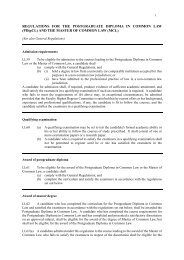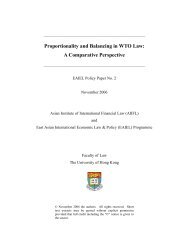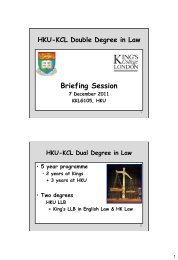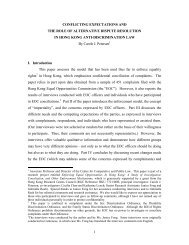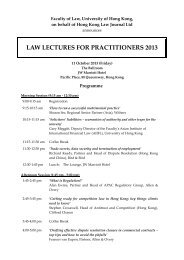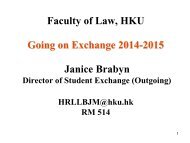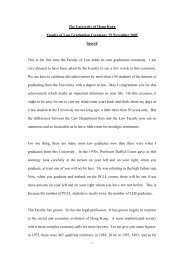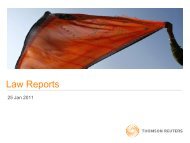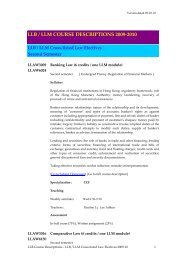Programme Brochure - Faculty of Law, The University of Hong Kong
Programme Brochure - Faculty of Law, The University of Hong Kong
Programme Brochure - Faculty of Law, The University of Hong Kong
You also want an ePaper? Increase the reach of your titles
YUMPU automatically turns print PDFs into web optimized ePapers that Google loves.
<strong>The</strong> <strong>University</strong> <strong>of</strong> <strong>Hong</strong> <strong>Kong</strong><strong>Faculty</strong> <strong>of</strong> <strong>Law</strong>www.hku.hk/law/jd1
Dean’s Message‘<strong>The</strong> aim <strong>of</strong> education should be to teach how to think,rather than what to think,’ It is with this conviction inmind that we introduced our JD programme on theFortieth Anniversary <strong>of</strong> our <strong>Law</strong> School. Having been apioneer in undergraduate legal education for forty years,we believed the time was ripe for us to introduce aunique and vigorous graduate law programme that takesinto account the needs <strong>of</strong> mature graduate students.Our vision is to create a top quality common lawprogramme that focuses both on depth and breadth.From the very beginning, we decided to have a smallintake. This would allow us to get to know our studentswell, to create a cozy, cordial and supportive learningenvironment, and to give individual attention to each<strong>of</strong> our students. It is now a few years down the roadand we know we made the right decision. We areable to give our students individual attention rangingfrom academic studies to career advice to personaldevelopment. Our graduates from this programmefind that they have experienced a most memorableand rewarding part <strong>of</strong> their life’s journey. <strong>The</strong>re isa stimulating and vibrant academic environmentfor learning, where they can learn from the leadingscholars, not only in our <strong>Law</strong> School, but from everypart <strong>of</strong> the world. <strong>The</strong> <strong>Programme</strong> is carefully structured,and the learning is vigorous and inspiring, focusingnot only on what the law is but what the law ought tobe, great emphasis being accorded critical analysisand lawyering skills. <strong>The</strong>re is regular interaction andfeedback between students and teachers, and thereis a strong bonding among the students themselvesand between the students and the academic staff.As an internationally prestigious university, we also<strong>of</strong>fer our students ample opportunities for internationalexposure, including international mooting competitionsand student exchange programmes, as well as careerplacement. We also run a joint JD-LLM programmewith the <strong>University</strong> <strong>of</strong> Pennsylvania <strong>Law</strong> School underwhich our students can spend a year on scholarship atone <strong>of</strong> the Ivy League Universities to obtain a mastersqualification. In short, our aim is to provide the bestlegal education for our students.This is a highly competitive programme, with topstudents applying from all over the world, and we lookforward to your joining us.Pr<strong>of</strong>essor Johannes Chan SC (Hon)Dean, <strong>Faculty</strong> <strong>of</strong> <strong>Law</strong><strong>The</strong> <strong>University</strong> <strong>of</strong> <strong>Hong</strong> <strong>Kong</strong>1
Overview <strong>of</strong> the <strong>Programme</strong>Qin LIU• Class <strong>of</strong> 2011• Bachelor <strong>of</strong> Science, Wuhan <strong>University</strong>, 2006• Bachelor <strong>of</strong> Arts, Wuhan <strong>University</strong>, 2006• Master <strong>of</strong> Arts, Boston <strong>University</strong>, 2008• Research Associate, Regeneron Pharmaceuticals,New York• Trainee, Skadden, Arps, Slate, Meagher & Flom,2012Besides being one <strong>of</strong> the most dynamic and colorful cities in the world, <strong>Hong</strong><strong>Kong</strong> has a legal system known for its judicial integrity and the subtle balance itmaintains between two disparate legal traditions. With its prestigious teachingstaff and the extensive opportunities it provides, the HKU <strong>Faculty</strong> <strong>of</strong> <strong>Law</strong> wasmy first choice for a sound common law education. <strong>The</strong> <strong>Faculty</strong>’s commitmentto the JD programme impressed me and eventually drew me to it. <strong>The</strong> idea <strong>of</strong>bringing together the best minds from different fields underpins the programmeand has been well executed by the <strong>Faculty</strong>. My peers together created the mostintellectually challenging and fulfilling experience I have had so far. Anyonewho is willing to take on the challenge would choose the JD programme in aheartbeat.<strong>The</strong> JD is a full-time, two-year law degree that provides comprehensive and in-depthlegal education to students without prior background in the law. <strong>The</strong> emphasis <strong>of</strong>the programme is not on rote learning <strong>of</strong> legal rules, but on critical appreciation andassessment <strong>of</strong> the underpinnings <strong>of</strong> these rules. <strong>The</strong> programme distinguishes itself byits small class size. JD students will be taught as a separate group <strong>of</strong> about 40 students.We believe that an intimate environment will facilitate interaction and enhance thelearning experience.<strong>The</strong> programme will provide students with a solid foundation in traditional commonlaw subjects, which are the bedrock <strong>of</strong> the <strong>Hong</strong> <strong>Kong</strong> legal system. In addition, theprogramme will introduce students to new ways <strong>of</strong> thinking about the law. Courses oninterdisciplinary and theoretical approaches to the law are a required component <strong>of</strong>the programme. <strong>The</strong>se courses will challenge students not only to understand what thelaw is, but also to contemplate what the law should be. <strong>The</strong> programme also includes abroad range <strong>of</strong> electives, which will allow students to explore their academic interestsand to develop a specialty. Such exploration and specialization will culminate in asubstantial dissertation, in which students are expected to engage with and advance thescholarship on cutting-edge areas <strong>of</strong> law.<strong>The</strong> JD programme <strong>of</strong>fers all the courses required for admission to the PostgraduateCertificate in <strong>Law</strong>s programme (PCLL). Graduates who have taken these courses willbe eligible to apply for admission to the PCLL and eventually to practise either as abarrister or a solicitor in <strong>Hong</strong> <strong>Kong</strong>.Learning in the JD programme will not be confined to the classroom. <strong>The</strong> <strong>Faculty</strong> <strong>of</strong><strong>Law</strong> is a serious community <strong>of</strong> research and scholarship. As a leading centre <strong>of</strong> legalresearch in Asia, students will benefit from the constant stream <strong>of</strong> visiting academicsfrom around the world. Recent visitors included eminent academics from institutionssuch as the <strong>University</strong> <strong>of</strong> Oxford, Harvard <strong>Law</strong> School, Yale <strong>Law</strong> School, to name buta few. <strong>The</strong> <strong>Faculty</strong> hosts frequent talks and workshops, and participates in numerousinternational mooting competitions, which are excellent opportunities for students tohone their research, writing, and oratorical skills.2
<strong>Programme</strong> StructureBasic Structure<strong>The</strong> JD programme can usually be finished in two years.<strong>The</strong>re are two semesters in each academic year: the firstsemester, which lasts from September to December, andthe second semester, which lasts from January to May.<strong>The</strong>re is also a one-month June semester in the second year.In order to complete the programme, students arerequired to take courses worth a total <strong>of</strong> 144 credits.A one-semester course in the JD programme is usuallyworth 6 credits, and a full-year course 12 credits. 84 <strong>of</strong>the required 144 credits comprise core courses, whichare listed below:Core Courses:• Commercial <strong>Law</strong>• Constitutional <strong>Law</strong>• Contracts I & II• Criminal <strong>Law</strong> I & II• Equity & Trusts I & II• Land <strong>Law</strong> I & II• Legal Research & Methods• Legal System• Torts I & IIStudents are also required to complete a 6-creditdissertation.<strong>The</strong> remaining 54 credits are devoted to electives.Students who wish to apply for the PCLL must take thefollowing 6-credit PCLL pre-requisite courses as theirelectives:• Civil Procedure• Company <strong>Law</strong>• Criminal Procedure• Evidence• Land <strong>Law</strong> III (Conveyancing)In the first year, students will take three one-year coursesin Contracts, Torts, and Criminal <strong>Law</strong> respectively.<strong>The</strong>y will also take three one-semester courses in LegalSystem, Legal Research & Methods, and Constitutional<strong>Law</strong> in the first semester, and two elective courses in thesecond semester.Legal System and Legal Research & Methods, whichintroduce students to the basics <strong>of</strong> legal study andprepare students for the substantive courses, willcommence earlier than other courses. <strong>The</strong>y will start inthe Induction Period, which takes place in the last twoweeks <strong>of</strong> August before the start <strong>of</strong> the first semester <strong>of</strong>the first year. Legal Research & Methods will continueuntil the end <strong>of</strong> September, while Legal System willconclude at the end <strong>of</strong> the first semester.<strong>The</strong> second-year curriculum is primarily devoted toelectives to allow students to explore their academicinterests and to develop an area <strong>of</strong> focus. <strong>The</strong> onlycore courses remaining are the full-year Equity &Trusts and Land <strong>Law</strong> courses, and the one-semesterCommercial <strong>Law</strong> course, which takes place in the firstsemester. <strong>The</strong> <strong>Faculty</strong> <strong>of</strong> <strong>Law</strong> <strong>of</strong>fers electives in a widevariety <strong>of</strong> cutting-edge areas <strong>of</strong> law, such as financiallaw, international arbitration, environmental law,competition law, intellectual property law, to namebut a few. <strong>The</strong>re are no restrictions on the selection<strong>of</strong> electives, except that students must choose at leastone elective from the “International, Comparative and<strong>The</strong>oretical Perspectives <strong>of</strong> <strong>Law</strong> (“ICT”)” list <strong>of</strong> courses,and one elective from the “Chinese <strong>Law</strong>” list <strong>of</strong> courses.Students are also encouraged to take part in local andinternational mooting competitions.3
Suggested Sequence <strong>of</strong> StudyYear 1 (66 credits)Year 2 (78 credits)Induction Period First Semester Second Semester First Semester Second Semester June SemesterLegal System(6 credits)Dissertation(6 credits)Contract I(6 credits)Contracts II(6 credits)Land <strong>Law</strong> I(6 credits)Land <strong>Law</strong> II(6 credits)Torts I(6 credits)Torts II(6 credits)Equity and Trusts I(6 credits)Equity and Trusts II(6 credits)*Elective(6 credits)Legal Research& Methods(6 credits)Criminal <strong>Law</strong> I(6 credits)Criminal <strong>Law</strong> II(6 credits)Commercial <strong>Law</strong>(6 credits)*Elective(6 credits)Constitutional <strong>Law</strong>(6 credits)*Elective(6 credits)*Elective(6 credits)*Elective(6 credits)*Elective(6 credits)*Elective(6 credits)*Elective(6 credits)*Elective(6 credits)* Students who intend to proceed to PCLL must take five PCLL pre-requisite courses as electives: Civil Procedure, Company <strong>Law</strong>, Criminal Procedure, Evidence, and Land <strong>Law</strong> III (Conveyancing).* Students must choose at least one elective from the “International, Comparative and <strong>The</strong>oretical Perspectives <strong>of</strong> <strong>Law</strong> (“ICT”)” list <strong>of</strong> courses, and one elective from the “Chinese <strong>Law</strong>” list <strong>of</strong> courses.4
Tuition FeesFor those enrolling in September 2012, the tuition fees are HKD 136,800(roughly USD 17,540) per year, or HKD 273,600 (roughly USD35,080) for the entiredegree. <strong>The</strong> tuition fees for the academic year 2013-2014 are now under review bythe <strong>University</strong> and are subject to upward adjustment.A non-means tested loan scheme is also available to students who meet theresidency requirements. Details and application forms are available at the Centre <strong>of</strong>Development and Resources for Students (CEDARS) (http://www.cedars.hku.hk).PARIYA ROJTANONGCHAI• Class <strong>of</strong> 2013• B.A., <strong>University</strong> <strong>of</strong> Cambridge, 2010I considered studying <strong>Law</strong> as an undergraduate,but at that time law appeared to me as quite a rigidsubject and I was not ready to commit to a specificcareer path. While reading history in Cambridge,I came across the field <strong>of</strong> law in my course andinteracted with many law students. I began to see that law is a multifaceted fieldthat is not only intellectually stimulating but also highly practical: the study <strong>of</strong> lawequips you with a set <strong>of</strong> essential skills to effectively handle various types <strong>of</strong> work.I chose the JD programme for its compact structure and the diversity <strong>of</strong> thestudent body. HKU, with its well-respected <strong>Faculty</strong> <strong>of</strong> <strong>Law</strong>, was always myfirst choice. I must say that the JD programme has been more fulfilling andchallenging than I had imagined. <strong>The</strong> small class size allows me to connect withand learn from my classmates, and to comfortably participate in the seminar-styleclasses. <strong>The</strong> programme is demanding, but I am very much looking forward towhat is yet to come.5
Student Pr<strong>of</strong>ile for 2012/2013 intakeMichelle Suhundergraduate educational background4%• Class <strong>of</strong> 2014• Bachelor <strong>of</strong> <strong>Law</strong>, Seoul National <strong>University</strong>, 2011I have always wanted to work in the internationalarena <strong>of</strong> legal pr<strong>of</strong>ession and came to desire thatI attain pr<strong>of</strong>essional legal qualifications in <strong>Hong</strong><strong>Kong</strong>. I chose <strong>Hong</strong> <strong>Kong</strong> not only because I ampersonally affiliated with the city, but also becauseit virtually has the largest legal market in Asia with a great deal <strong>of</strong> potential as aresult <strong>of</strong> the entry <strong>of</strong> many international law firms and growing business relationswith mainland China.14%14%11%17%40%US UniversitiesMainland UniversitiesLocal UniversitiesUK UniversitiesCanadian UniversitiesOthersI am honored to join in HKU’s JD <strong>Programme</strong>, as HKU <strong>Faculty</strong> <strong>of</strong> <strong>Law</strong> is knownfor its prestigious reputation. It seems like every day is a challenge as studentshave to cope with the tight schedule and heavy workloads. I am sure I will gain alot from the excellent faculty members as well as the well-motivated classmates,and build a good foundation <strong>of</strong> common law by the end <strong>of</strong> the programme.Students with Postgraduate Degrees11%With Postgraduate DegreesWithout Postgraduate Degrees89%6
Students with Work ExperienceSIU LUNG (KANE) LO11%6%11%72%Fresh Graduate1-2 Years3-4 Years> 4 YearsBreakdown <strong>of</strong> Undergraduate Subjects• Class <strong>of</strong> 2013• B.S. in Biomedical Engineering, <strong>University</strong> <strong>of</strong>Rochester, 2010• M.S. in Biomedical Engineering, Yale <strong>University</strong>, 2011During my postgraduate study at Yale’s School <strong>of</strong>Engineering and Applied Science, I had the opportunityto patent a bacteria detection device in a team projectwhich subsequently won a national competition. That experience illustrated theoverlap between engineering and law but left me with more questions than answers.It piqued my curiosity about the legal field. After consulting with fellow students,I was surprised to discover the complementarity <strong>of</strong> skill-sets between engineering andlaw, and realized the value in acquiring both <strong>of</strong> them.14%6%11%40%29%Economics, Finance, and AccountingHumanities and Social SciencesLanguagesSciences<strong>Law</strong> (non-Common <strong>Law</strong> Jurisdictions)I chose HKU because <strong>of</strong> the renowned reputation <strong>of</strong> its law faculty as well as theample career opportunities in <strong>Hong</strong> <strong>Kong</strong>. A few months into the programme,it has already exceeded my expectations. My pr<strong>of</strong>essors are experts in their fieldsand dynamic in the classroom, and the small class size enables students and thefaculty to interact closely. <strong>The</strong> small class size also makes it easy for students to formstudy groups early on. It is exciting to collaborate outside <strong>of</strong> the classroom, and ourdiverse backgrounds contribute to the medley <strong>of</strong> viewpoints and ideas, enrichingthe discussion and providing new perspective when solving legal problems. I amconfident that the JD programme will provide a great foundation to embark on mylegal career.7
Admission CriteriaBasic Selection CriteriaWe receive over 400 applications each year for a class <strong>of</strong> approximately 40 students.<strong>The</strong> JD programme looks for a record <strong>of</strong> demonstrated academic excellence. We expectto admit applicants with degree qualifications with at least a 2:1 or the equivalent(cum laude from North American universities / CGPA 3.3 out <strong>of</strong> 4 or above) froma reputable university in <strong>Hong</strong> <strong>Kong</strong> or overseas. We seek to admit students withdiverse backgrounds and relevant pr<strong>of</strong>essional and other experiences. To help us makebetter decisions, some applicants may be asked to attend in-person or phone/videointerviews.English Language RequirementCourses in the JD programme will require a substantial volume <strong>of</strong> reading and regularwritten assignments. Moreover, students are expected to make frequent contributions toclass discussions. <strong>The</strong>refore, we expect a high degree <strong>of</strong> pr<strong>of</strong>iciency in English from ourstudents.Applicants who did not graduate from a university in which the medium <strong>of</strong> instructionis English are required to take either IELTS (International English Language TestingSystem) or TOEFL (Test <strong>of</strong> English as a Foreign Language). <strong>The</strong> following are theminimum requirements on IELTS and TOEFL for admission to the JD programme:IELTS: a minimum overall band score <strong>of</strong> 7.5, with no individual score below 6.5, and aminimum band score <strong>of</strong> 7.0 in the academic writing module.TOEFL: a minimum score <strong>of</strong> 600 on the paper-based test (or 250 on the computerbasedtest or 100 on the internet-based test).<strong>The</strong>se results must be obtained no more than two years prior to the expected date <strong>of</strong>entry to the JD programme. For example, if a candidate is submitting his/her applicationfor entry in September 2013, his/ her English test scores must have been obtained noearlier than September 1, 2011.8
How to applyApplication Form and Supporting Documents<strong>The</strong> online application form can be found at www.asa.hku.hk/admissions/tpg.Apart from basic biographical information and information about past academicperformances and pr<strong>of</strong>essional experiences, applicants are required to submit thefollowing supporting documents after they have submitted an online application:1. One photocopy <strong>of</strong> applicant’s HKID card or passport showing personalparticulars;2. One personal statement <strong>of</strong> no more than 600 words;3. One writing sample, which should be an assignment or coursework submittedduring undergraduate or postgraduate study, and <strong>of</strong> no more than 10 doublespacedpages (font size 12);4. Original or certified copies <strong>of</strong> academic transcript(s) (certified translations inEnglish where appropriate);5. Original or certified copy <strong>of</strong> IELTS / TOEFL test score report(s), if required; and6. Two letters <strong>of</strong> reference and standard reference request forms from academicreferees (the standard reference request form is available for download at theonline application system; the letter <strong>of</strong> reference and form must be kept in asealed envelope with referee’s signature across the flap).<strong>The</strong> above supporting documents should be sent directly to the following addressby registered mail or by courier by the application deadline (the post-mark will bereferred to):<strong>Faculty</strong> <strong>of</strong> <strong>Law</strong>10/F Cheng Yu Tung Tower<strong>The</strong> <strong>University</strong> <strong>of</strong> <strong>Hong</strong> <strong>Kong</strong>Pokfulam Road, <strong>Hong</strong> <strong>Kong</strong>(Re: JD Application [Your Name and Application Number here])A complete application should include all <strong>of</strong> these items, except for the academictranscript(s) and IELTS / TOEFL test score report(s), which applicants may choose toinstruct the relevant entities to send directly to us. Applicants are strongly encouragedto send us a complete application as it can help us expedite the application reviewprocess. An application will not be reviewed and acted upon until it is complete.InterviewInterviews will mostly be conducted in March. Depending on the location and theavailability <strong>of</strong> the applicant, he/she may be asked to attend an in-person or a phone/video interview. Applicants who are located in <strong>Hong</strong> <strong>Kong</strong> will be asked to attend anin-person interview. Applicants who are located outside <strong>of</strong> <strong>Hong</strong> <strong>Kong</strong> will be askedto attend either, where possible, a videoconference interview, or a phone interview.However, highly qualified applicants may be admitted without an interview.10
Application Deadline<strong>The</strong> deadline for application and submission <strong>of</strong> supporting documents is end <strong>of</strong>January. Please check our website (http://www.law.hku.hk/jd) for the exact date.Subject to availability <strong>of</strong> places, late applications will be considered.Application ResultMost applicants will receive a decision by mid-April. Admitted applicants willbe required to accept the <strong>of</strong>fer and pay the non-refundable deposit by the end<strong>of</strong> April.Expedited ReviewStudents who have received admission <strong>of</strong>fers from other programmes that expireprior to our usual notification time should get in touch with the AdmissionsCommittee at jdinfo@hku.hk. We are able to accommodate these applicants andprovide expedited review <strong>of</strong> their applications. Applicants requesting expeditedreview are required to provide documentary pro<strong>of</strong> <strong>of</strong> an <strong>of</strong>fer from anotherprogramme.Contact usFor further inquiry, please send us an email at jdinfo@hku.hk.Gideon Ho• Class <strong>of</strong> 2014• MEng, <strong>The</strong> <strong>University</strong> <strong>of</strong> Oxford, 2000• MSc, Imperial College London, 2004• Vice President, Deutsche Bank, 2007-2008• Chief Investment Officer, Austen Capital, 2009-2012Having spent more than ten years in the investment bankingindustry, I realized how widely applicable law was to everyaspect <strong>of</strong> my career. I was inspired by my wife who was a finance lawyer in a magiccircle firm and decided to strengthen my knowledge in this area. In particular, I wasintrigued by the various regulatory requirements in investment banking and hoped tounderstand and explore them in greater details.It was an easy decision when I had to choose between the HKU and otherequivalent JD programmes. <strong>The</strong> HKU JD programme simply stands out because <strong>of</strong>its outstanding teaching quality and strong alumni network which are essential toa successful career in law. Most <strong>of</strong> all, the strong and diverse background <strong>of</strong> myfellow students helps create a competitive yet healthy learning environment. <strong>The</strong>small class size ensures that lively and in-depth discussions can take place. Apartfrom classroom teaching, the programme features plenty <strong>of</strong> opportunities for practicallearning, such as attendance <strong>of</strong> court proceedings and completion <strong>of</strong> assignmentsbased on real legal cases. <strong>The</strong>se reinforce my belief that the programme excels inpreparing students for a legal career. Indeed, I have already felt like a lawyer intraining after a mere 2 months into the programme!11
Frequently Asked QuestionsGeneral Information1 How long does it take to complete the JD programme?<strong>The</strong> JD programme will usually take two years to complete. <strong>The</strong>se include fourfull-length semesters and one 4-week semester in June in the second year. Underexceptional circumstances, such as taking up exchange studentships in overseasuniversities, students may be allowed to extend the programme beyond 2 years.2 Is it possible to enrol in the JD programme on a part-time basis?No. <strong>The</strong> JD programme is a full-time programme. Students must be enrolled ona full-time basis only. Given the intensive nature <strong>of</strong> the curriculum, students willnot be able to undertake part-time employment while enrolled in the programme.Classes will be held during the day.3 Will the <strong>Faculty</strong> <strong>of</strong>fer a part-time JD programme in the near future?No. <strong>The</strong> <strong>Faculty</strong> has no plans to <strong>of</strong>fer a part-time JD programme in the nearfuture.4 How many intakes <strong>of</strong> students are there in each academic year?Nathan WONG• Class <strong>of</strong> 2011• B.A. <strong>The</strong> <strong>University</strong> <strong>of</strong> <strong>Hong</strong> <strong>Kong</strong>, 2007• Tax Associate, Deloitte Touche Tohmatsu,2007-2009• Trainee, Clifford Chance, 2012My work experience showed me the centralrole the law plays in commercial life - frompermitting the government to raise revenue to structuring corporatetransactions. Building on my interest in the subject, I decided to apply to theJD programme.<strong>The</strong> programme was challenging yet rewarding. All our classes were in theform <strong>of</strong> graduate-level seminars which encouraged class participations,and classmates from different walks <strong>of</strong> life brought diverse perspectives tothe discussions. We were approached by the academic staff and even theDean <strong>of</strong> the <strong>Faculty</strong> for feedback so that adjustments could be made to theprogramme.<strong>The</strong>re is only one intake <strong>of</strong> students in each academic year, which is in August.12
5 How large are the classes in the JD programme?One <strong>of</strong> the distinctive characteristics <strong>of</strong> the JD programme is its small class size.At least in the initial few years, we expect the annual enrolment to be about 40students. <strong>The</strong>refore, students will enjoy an intimate learning environment.6 Would JD students attend classes with other students?JD students will attend classes with each other in all core courses. <strong>The</strong>y will beable to take advantage <strong>of</strong> the wide array <strong>of</strong> electives <strong>of</strong>fered by the <strong>Faculty</strong> <strong>of</strong><strong>Law</strong>, where they will broaden their horizons through interaction with our LLMstudents, many <strong>of</strong> whom are experienced pr<strong>of</strong>essionals, or exchange students.7 What is the honours classification in the JD programme?Honours classification in the JD programme will be in line with the practice inthe LLB programme. <strong>The</strong>re will be first class, second class (upper), second class(lower), third class and pass.8 Does the JD programme provide exchange opportunities?9 Is it possible to obtain advanced standing for coursework undertaken prior toenrolment in the JD programme?Under exceptional circumstances, the <strong>Faculty</strong> <strong>of</strong> <strong>Law</strong> will grant advancedstanding. However, the standard for advanced standing is very high, and the<strong>Faculty</strong> must be satisfied that the course(s) undertaken in another programmemeets the rigorous standard <strong>of</strong> the JD programme. <strong>The</strong> maximum number <strong>of</strong>advanced standing credits is 12. Under no circumstances will a student beallowed to graduate from the JD programme with fewer than 132 credits worth<strong>of</strong> coursework undertaken in the programme.10 Is accommodation provided to overseas students?<strong>The</strong> <strong>University</strong> provides student accommodation. While the <strong>University</strong>endeavours to meet the accommodation needs <strong>of</strong> overseas students, supply <strong>of</strong>accommodation usually outstrips demand. If <strong>University</strong> accommodation provesunavailable, students have the option <strong>of</strong> renting private accommodation near the<strong>University</strong>. Further information <strong>of</strong> <strong>University</strong> accommodation is available at theCentre <strong>of</strong> Development and Resources for Students (CEDARS) website athttp://cedars.hku.hk.<strong>The</strong> <strong>Faculty</strong> <strong>of</strong> <strong>Law</strong> has entered into an exchange agreement with the <strong>University</strong><strong>of</strong> Pennsylvania <strong>Law</strong> School, one <strong>of</strong> the top law schools in the US. Under thisexchange agreement, JD students extend their study by one year and go onexchange at Penn <strong>Law</strong> School, from which they will receive a Master’s <strong>of</strong> <strong>Law</strong>(LLM) degree upon completion <strong>of</strong> their study.13
<strong>The</strong> Application ProcessWILSON YUEN• Class <strong>of</strong> 2012• B.A. (Hons), <strong>University</strong> <strong>of</strong> California,Los Angeles, 2010I encountered the field <strong>of</strong> law in a number<strong>of</strong> courses, such as International <strong>Law</strong> andAmerican Constitutional <strong>Law</strong>, during myundergraduate studies in Political Science andInternational Development Studies at UCLA. My interest in law continuedto grow and I eventually decided to pursue legal study. I chose the JDprogramme because <strong>of</strong> the reputation <strong>of</strong> the <strong>University</strong>’s law faculty amongthe legal pr<strong>of</strong>essionals in <strong>Hong</strong> <strong>Kong</strong>.<strong>The</strong> JD programme has been a challenging yet rewarding experience, whichrequires an extraordinary commitment to manage the workload. <strong>The</strong> smallclass size is a unique feature <strong>of</strong> the JD programme, since it not only providesa platform for exchange <strong>of</strong> ideas among classmates, but also facilitatesinteraction with faculty members. Furthermore, some <strong>of</strong> the faculty membersare practicing barristers. From them, students learn legal doctrines andprinciples and acquire insights into the legal pr<strong>of</strong>ession. This is particularlyvaluable to me given my career aspirations.11 When does the application review process begin?<strong>The</strong> Admissions Committee will not begin to review applications until after thedeadline. In other words, there is no need to submit one’s application early toattempt to secure an advantage.12 Is there an admissions test as part <strong>of</strong> the applicant process?No. <strong>The</strong>re is no admissions test as part <strong>of</strong> the application process.13 Are applicants required to attend an interview as part <strong>of</strong> the applicationprocess?Some applicants may be asked to attend an interview, either in-person or bytelephone or videoconference. However, it is possible for an applicant to beadmitted without an interview. An applicant should not infer from a lack <strong>of</strong>interview request as an indication <strong>of</strong> rejection.14 Is a current final-year undergraduate eligible to apply to the JD programme?Yes. <strong>The</strong> eligibility requirement is that the applicant must have completed his/herundergraduate degree by the time he/she enrols in the JD programme. <strong>The</strong>refore,a current final-year undergraduate who will have received his/her undergraduatedegree prior to enrolment in the JD programme is eligible to apply.14
15 If an applicant has undertaken some prior study <strong>of</strong> law, either in his/herprevious degree programmes or in other contexts, is he/she eligible to apply tothe JD programme?<strong>The</strong> eligibility rule is that the applicant must not have completed a full lawdegree, such as an LLB or the equivalent, from a common law jurisdiction.Applicants who have undertaken some legal study previously are eligibleto apply.16 If the medium <strong>of</strong> instruction <strong>of</strong> an applicant’s undergraduate degree wasnot English, but he/she is currently pursuing or has completed a Master’s orcomparable advanced degree in English, is the applicant subject to the EnglishLanguage Requirement?No. However, the more years <strong>of</strong> education an applicant has completed inEnglish, the more confident the Admissions Committee will be <strong>of</strong> his/her Englishabilities. <strong>The</strong>refore, if the applicant wishes to provide further evidence <strong>of</strong> his/herEnglish abilities, the applicant may consider taking either IELTS or TOEFL.JENNY CHUNG• Class <strong>of</strong> 2013• B.B.A., <strong>The</strong> Chinese <strong>University</strong> <strong>of</strong> <strong>Hong</strong> <strong>Kong</strong>• Client Partner, Korn/Ferry International,1999-2008• Principal, Heidrick & Struggles, 2009-2011Having worked with a broad spectrum <strong>of</strong> clientsacross different industries in the leadership advisoryarena, it became apparent to me that legal knowledge is a valuable asset forbusiness practitioners. I believe the rigorous and disciplined training providedby the study <strong>of</strong> law will hone one’s analytical and communication skills andfurther develop one’s critical thinking–qualities that will complement practicalexperiences and enhance personal effectiveness.<strong>The</strong> JD programme <strong>of</strong>fers an intellectually challenging environment for a relativelysmall group <strong>of</strong> students with diverse backgrounds to interact with and learn fromeach other. HKU’s <strong>Faculty</strong> <strong>of</strong> <strong>Law</strong> is a well-established and prestigious institution,attracting top quality faculty members and students from all over the world. I havegreatly enjoyed the opportunity to learn with a highly talented and motivatedgroup and have no doubt that the experience will be equally fulfilling for bothmature students and fresh graduates.15
Charlotte HO• Class <strong>of</strong> 2011• B.A., Tufts <strong>University</strong>, 2009• Trainee, Linklaters, 2012While pursuing my undergraduate degree at Tufts, Iencountered the field <strong>of</strong> law in a number <strong>of</strong> my courses.I majored in Political Science and the overlap betweenthese two disciplines sparked my initial curiosity for thelegal pr<strong>of</strong>ession. I found that law <strong>of</strong>fered great insights into business, public affairsand politics, areas in which I have great interests. Furthermore, the appeal <strong>of</strong> the JDprogramme lies in the fact that it is a versatile degree which teaches you a valuableset <strong>of</strong> skills that will prove useful in many different career paths. I decided to pursuethe JD at HKU because <strong>of</strong> the <strong>University</strong>’s well-established law faculty and strongreputation. More important though was the fact that the programme was specificallytailored towards a small class size, which I believe facilitates the learning processthrough the sharing <strong>of</strong> ideas and interaction amongst students.Having successfully completed the JD programme in August 2011, I am very proud tobe part <strong>of</strong> the inaugural class <strong>of</strong> the JD. <strong>The</strong> programme far exceeded myexpectations, giving me a solid foundation to pursue a legal pr<strong>of</strong>ession. It wasparticularly helpful that Pr<strong>of</strong>essors were always on hand to provide guidance,not only in academic work but also in career paths. I have no doubt that thosewho choose this programme will be well equipped for whatever their future lifechoices may be.17 If an applicant is exempted from the English language requirement, butnonetheless would like to provide the Admissions Committee his/her IELTSor TOEFL scores, would the Admissions Committee take this informationinto account?Yes. Any information that will allow the Admissions Committee to arrive atan informed decision would be appreciated. Additional information aboutan applicant’s English abilities would be particularly helpful if the applicant’sundergraduate subject did not require extensive use <strong>of</strong> English. In such case,the requirement that the test be taken within two years prior to an applicant’smatriculation at the JD programme would be relaxed. <strong>The</strong> Admissions Committeewill adjust the weight to be accorded to submitted test scores based on theircurrency.18 If an applicant thinks that his English results from A-Level or DSE do not fullyrepresent his/her current English abilities, what may the applicant do to expressthat to the Admissions Committee?<strong>The</strong> best way for an applicant to convince the Admissions Committee that his/herA-Level or DSE English results do not fully reflect his/her current English abilitieswould be to take either IELTS or TOEFL and submit the results to the AdmissionsCommittee. <strong>The</strong> applicant should also expend extra effort on the personalstatement and the writing sample, on which the Admissions Committee will relyto gauge an applicant’s English abilities.16
19 Can an applicant submit a reference without the reference form?No. <strong>The</strong> reference form was designed with the express purpose <strong>of</strong> providing theAdmissions Committee the information which it needs to evaluate an applicant.<strong>The</strong>refore, applicants are required to ask their referees to fill out the referenceforms.20 If an applicant graduated from university years ago and is no longer able toobtain an academic reference, would an academic reference still be expected?<strong>The</strong> Admissions Committee expects at least one academic reference from eachapplicant. However, under exceptional circumstances, such as that describedabove, the Admissions Committee appreciates that it may be impossible for anapplicant to submit an informed academic reference. Under those circumstances,pr<strong>of</strong>essional references would suffice.21 Are there other circumstances under which an applicant may be exempted fromthe writing sample requirement?<strong>The</strong> writing sample is generally required <strong>of</strong> all applicants. If an applicant isunable to furnish a writing sample submitted as part <strong>of</strong> his/her tertiary education,perhaps because the applicant obtained his/her last degree years ago, theapplicant should consider submitting written work produced at work. If thatproves difficult, the applicant may seek an exemption from the AdmissionsCommittee. However, applicants should note that absent a writing sample, theAdmissions Committee will place greater emphasis on other indicators <strong>of</strong> Englishpr<strong>of</strong>iciency, such as the personal statement and English test scores.17
22 If an applicant has completed a number <strong>of</strong> degrees, are the results from any<strong>of</strong> them, for example, the most recent one, more relevant to the admissiondecision than results from the other degrees?No. <strong>The</strong> Admissions Committee will take a holistic view <strong>of</strong> the application,taking into account the applicant’s full tertiary educational record. <strong>The</strong>refore,results from every degree will be considered.23 May an applicant request an individual meeting with the AdmissionsCommittee?<strong>The</strong> Admissions Committee appreciates your interest in the programme.However, in the interest <strong>of</strong> maintaining impartiality in the review process,the Admissions Committee decided not to have individual meetings withpotential applicants. However, applicants are encouraged to submit anyquestions they may have to jdinfo@hku.hk. <strong>The</strong> Admissions Committeeendeavours to answer them promptly.18
24 Where may an applicant certify his/her documents?ROBYN CROWTER• Class <strong>of</strong> 2012• Master <strong>of</strong> Arts in Psychology, <strong>University</strong> <strong>of</strong>St Andrews, 2007<strong>The</strong> JD programme has met all my expectationsin terms <strong>of</strong> challenging materials, knowledgeablepr<strong>of</strong>essors, and bright classmates. JD students area varied group, having studied at undergraduateprogrammes in North America, Europe, as well as regionally and locally. As JDstudents all share the same courses during the first year, my class developed awonderful sense <strong>of</strong> camaraderie.I feel that although the JD programme takes only two years, it is intensiveenough to give a good grounding in legal fundamentals in preparation for workin the legal field in <strong>Hong</strong> <strong>Kong</strong>. I recommend the programme if you are lookingfor interactive classes, demanding pr<strong>of</strong>essors, and motivated classmates.Applicant may certify his/her documents before a notary public(e.g. Commissioner for Oaths at Public Enquiry Service Centres <strong>of</strong> HomeAffairs Office, <strong>Hong</strong> <strong>Kong</strong> SAR Government), or certified by the appropriate<strong>of</strong>fice/department <strong>of</strong> his/her institution.Alternatively, applicant may bring the originals and photocopies <strong>of</strong> eachdocument to the HKU Academic Services Enquiry Office for certification:Address:Room G-04, Ground FloorRun Run Shaw Building, Main Campus<strong>The</strong> <strong>University</strong> <strong>of</strong> <strong>Hong</strong> <strong>Kong</strong>Pokfulam Road, <strong>Hong</strong> <strong>Kong</strong>.Office Hours:Monday to Friday: 9:00 am - 5:30 pm;Saturday: 9:00 am - 12:30 pm.(Closed on Sunday, public holidays and <strong>University</strong> holidays.)Tel.: (852) 2859 243319
PCLL Admissions and Career Prospects25 Would JD graduates still be required to take further examinations in law to beeligible to apply for the PCLL?No. Graduates <strong>of</strong> the JD programme who have taken Company <strong>Law</strong>, Evidence,Civil Procedure, Criminal Procedure, and Land <strong>Law</strong> III will satisfy all the core lawcourses required for eligibility to enter the PCLL. <strong>The</strong>re is no need to take anyfurther examination in law.26 Will the <strong>Faculty</strong> reserve PCLL places for our JD graduates?No. PCLL admissions are run separately and our JD graduates will be treated thesame as other applicants to the PCLL.28 What are the career prospects for our JD graduates beyond the legal field?We believe that the JD qualification will be a valuable credential regardless <strong>of</strong> thefield a graduate chooses to pursue. In fact, many <strong>of</strong> the <strong>Faculty</strong>’s graduates pursuecareers in other fields than law, such as business, politics and civil service.29 Can a JD graduate practise outside <strong>Hong</strong> <strong>Kong</strong>?While we believe that our JD graduates will possess the analytical skills andlegal training to excel in any jurisdiction, graduates who plan to practise in otherjurisdictions must still satisfy local qualification requirements, just like graduateswho plan to practise in <strong>Hong</strong> <strong>Kong</strong> must complete the PCLL.27 What are the career prospects for our JD graduates in the legal field?Our JD graduates are highly sought after by the best law firms and chambersin <strong>Hong</strong> <strong>Kong</strong>. Given the small enrolment number in the programme, our JDgraduates enjoy an advantage over graduates <strong>of</strong> comparable programmes in <strong>Hong</strong><strong>Kong</strong>. We also endeavour to maintain very high admission standards so that ourgraduates will continue to enjoy the reputation <strong>of</strong> the programme long after theirgraduation.20
<strong>The</strong> <strong>University</strong> <strong>of</strong> <strong>Hong</strong> <strong>Kong</strong><strong>Faculty</strong> <strong>of</strong> <strong>Law</strong>10/F, Cheng Yu Tung Tower, Centennial Campus<strong>The</strong> <strong>University</strong> <strong>of</strong> <strong>Hong</strong> <strong>Kong</strong>Pokfulam Road, <strong>Hong</strong> <strong>Kong</strong>Tel: (852) 3917 2932E-mail: jdinfo@hku.hkWebsite: www.law.hku.hk/jd12


